Democracy is deemed to be the best system of government in the world today. This is so because the system tends to protect the interest of citizens first. Currently, most of the countries of the world (including the world power, USA) practice a democratic system of government. In this article, i will be discussing everything you need to know about democracy. Basically, we will be looking at the meaning of democracy, features of democracy, merits or advantages of democracy and the demerits or disadvantages of democracy in a state. Nonetheless, i will elaborate more on the features of democracy. If you have been searching for an article that comprehensively explains democracy and its features, this is for you.
Meanwhile, before moving to the crux of this topic, i would like to give some rudimentary information about democracy and its origin. This will help you to understand rapidly when i will go into details. So, let’s get started!
MUST READ:
- Importance of a Local government in a state
- How to become a successful lawyer: 9 Successful lawyer tips
- How to apply for law internship in a law firm
Origin and Meaning of Democracy
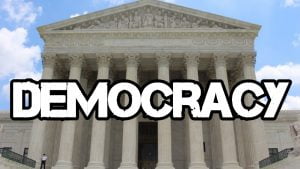
Democracy is a Greek word which literally means “rule by the people“. It is a form of government in which the people have the authority to choose their governing legislation. In a democratic state or government, the supreme power of the state is vested on the people because they make political decisions that concerns the state either directly or through representatives periodically appointed by them.
This definition has been corroborated by the Oxford Learner’s Dictionary. It defines democracy as government by the people; a form of government in which the supreme power is vested in the people and exercised directly by them or by their elected agents under a free electoral system.
Above is a YouTube video explaining the meaning of democracy and the key features of a democratic government.
Two Major Types Of Democracy
1. Direct Democracy: This is where all the citizens attend the Assembly and take part in the decision making process, in order to govern the state or the society. This type of democracy was practiced in ancient small greek city. It was also parcticed in Nigeria during the Igbo precolonial administration.
2. Indirect Democracy:
In this system of democracy, the citizens the citizens through election, elect those who will represent and govern the state on their behalf. This is opposed to the direct democracy where everyone is actively participating in the governance of the day. This type of democracy replaced the direct democracy in modern states as it is impossible for everyone to participate due to the large number of people.
12 Main Characteristics/Features of Democracy
Below are the key characteristics of democracy:
1. Existence of the Constitution: In every democratic nation, there is usually the existence of a constitution which is either written or written. A constitution can simply be defined as the fundamental laws or rules which guides a state or society. It establishes the institutions of the government such as the legislature, the executive and the judiciary and define their powers. The constitution also contains the rights and duties of the citizens and the government.
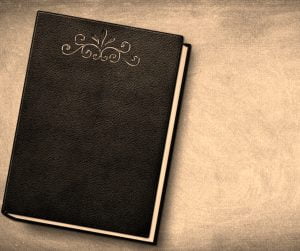
It is imperative to note that there are two types of institutions namely: Formal and informal institutions. Formal instructions are those which discharge formal functions such as the three arms of the government. On the other hand, infomal institutions are those which discharge informal responsibilities such as the political parties and the press. In a democratic society, the constitution usually state how these institutions functions.
2. Popular participation in politics: One the most important features of democracy is popular participation in politics. From the definition of democracy explained above, it is clear that any system which does not encourages people to participate in the political decision making of the government is not democratic.
Consequently, popular participation is not just a feature of democracy, it is an essential part of the system. People have to participate in politics either directly or through a representative which is legitimately recognized by them.

Take for instance, in Nigeria (a federal system), people at the local level, who can not actively participate in politics at the central level, are allowed to elect senators who represent their opinions at the central level. No doubt, popular participation in politics is one of the features of democracy that cannot be jettisoned.
3. Legitimacy: When I was in secondary school, I was taught that Legitimacy is the recognition of of the people of a state, the right of their leaders to govern. This definition of Legitimacy is actually very short and understandable.
Oxford dictionary defines democracy as when there is conformity to the law or to rules. I personally agree with the definition of Legitimacy in political science which Wikipedia says is the right and acceptance of an authority, usually a governing law or a regime.

I explained earlier that in a democratic state, the people are allowed to select who to govern them. This is what is known as Legitimacy. Here, the people will unanimously agree on who will administer their political affairs.
This is usually done by voting and it is recognized by the law which the people have consented to. Apparently, this is why Abraham Lincoln said that democracy is a government of the people, by the people and for the people. This postulates that in a democratic state the people are very key.
4. Periodic election: Since the people are the supreme in a democratic state, there is usually a fixed tenure for conducting elections. This is to make sure that the political powers of the state is not concentrated in a single hand. In the United States of America for instance, the president of the United States is elected indirectly to a four-year term, with a term limit of two terms.
In Nigeria, the president is to stay for four years in office after which another election will be conducted.

It is pertinent to note that periodic elections is a very essential feature of democracy because, where there is one particular leader administering the affairs of a state for eternity, that state cannot be said to be a democratic state. The people must be allowed to choose and change their leaders because they are supreme.
Also read:
- Differences between Unitary and Federal system of government
- Advantage and disadvantages of an unwritten constitution
- Differences between Rigid and Flexible constitution
- See the difference type of constitution
- General defences in criminal law
5. Separation of power: Separation of power is a political concept by Charles-Louis de Secondat, baron de La Brède et de Montesquieu, an 18th century French social and political philosopher. It means that the political powers of a state should not be concentrated in one single hand. It should rather be separated and sheared to avoid dictatorship.
Here, the political powers of the state are shared between the arms of government (That is, the Executive, Legislature and the Judiciary). The Legislature makes the law of the state. The executive implements the law and the judiciary interprets the law.
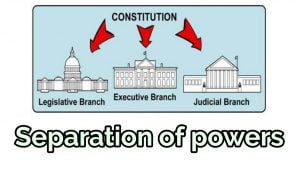
These powers are separated such that, there will be no interference in their activities. There arms of government are only allowed to check the activities of each other to ensure that they all conform to the law of the state which the people agrees with.
6. Checks and balances: The theory check and balances is an extension of the theory of separation of powers. It was propounded by Montesquieu in his book titled “The Spirit of the Laws“. According to research, Montesquieu’s theory of checks and balances is a principle of government under which separate branches are empowered to prevent actions by other branches and are induced to share power.
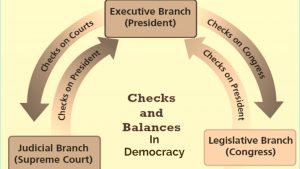
In that same light, checks and balances in a democratic state, ensures that the different arms of Government checks the actives of each other. Take for instance, if the legislature makes a law that it is not supposed, or prohibited from making, the judiciary can declare such law to be null and void.
It should be noted that for the principle of Checks and balances to be effective, there is need to give each arm autonomy to act on their own but not outside what is provided in the law.
Financial autonomy is also very important to ensure the effectiveness of checks and balances in a democratic government. No doubt, it is a very important feature of democracy.
Also read:
- Nigerian cases on frustration of contract
- Leading cases on the breach of contract
- Donoghue v Stevenson: Facts, Issues and decision of the court
7. Existence of political parties: A political party is a union of like minded people who come together to take over power power. In a democratic state, there should be political parties. Not just one political party but two or more.
This is to ensure that the masses have different choices to choose from. A one party state cannot be said to be a democratic state because there is just one political party in the state. So the people does not really have any option.

Just like I have explained earlier. Democracy postulates that the people are Supreme and as such, they have the power to decide who will administer their political affairs. Conversely, a state where there is no political party or just one political party or where the people are not allowed to select anybody they want as leader, is not a democratic state.
Also read: Why are lawyers liars? See the reason here
8. Equality before the law: In a true democratic state, there is equity before the law. This form of government does no encourage the idea that some class of citizens should or should not be punished for their actions. Even the legitimate leaders in a democratic state are forced to face the law during or after their service of the nation.
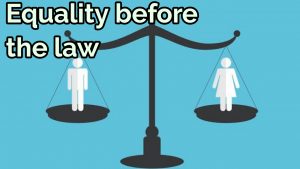
Equality is a key feature of democracy because it postulates that citizens have thesame rights to vote and to be voted for. This means that all votes casted in a democratic state during election is valid, not withstanding wealth or position of the person who casted the vote. This is exactly what is called equality.
9. Fundamental human rights: Fundamental human rights are also very important features of a democratic state. They are those inalienable and immutable right that is given to a member of a state as soon as he/she is born.
These rights helps to protect the citizens of that state from molestations by dictators. This is why it is important that the Fundamental human rights of people in a democratic state be entrenched in the constitution of every state.
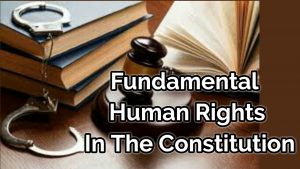
In the constitution of the Federal republic of Nigeria for instance, the Right to human dignity is protected under section 4 of the constitution. This right protects the citizens of Nigeria from any act by another person that degrades their dignity.
There are other fundamental human rights that also help to ensure effective practice of democracy. The freedom of the press is one of them. Evidently, press freedom is one of the essential pillars of a democratic state. It is also one of the main features of democracy.
10. Press freedom: Freedom of the press or press freedom is also a key feature of every democratic nation because the press play important roles in a democracy. First of all, this principle means that the people are allowed to freely create print and online media houses with the aim of disclosing and analyzing government activities. It brings about accountability in governance and that is one of the tenets of democracy.

Where there is no press freedom then there is no democracy because the government will hardly be accountable to the people, knowing fully well that their actions are not being watched and disclosed. This is the case in some of the most corrupt African and European countries in the world today.
It should, however, be noted that there is usually a limit to this freedom too. In most countries, where the press tries to blasphem the government or incite the people to attcethe government, it will deemed to be an act of treason and the punishment can be deadly.
Recommended: Most Famous People in the World 2022
11. Rule by the Majority: Democracy is a concept of governance where every decision is made in favour of the majority interest. The will of the majority always prevails. Elections are won a by majority votes, opinion polls are given weight by majority views, referendum is conducted by majority votes, bills in the legislative houses are decided based only specified majority votes, courts and tribunals adopt the majority decision as their final decision, and so on.
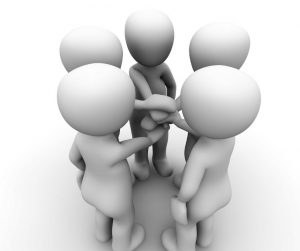
The majority rule is a principal feature of democracy. It is implicated virtually in all aspects of decision-making in a democratic setting.
Also see: Most Dangerous People In the World 2022
12. Absence of dictatorship and oppression: Democracy is characterized by the absence of dictatorship and oppression of the masses. Dictatorship is a type of government where an individual or group of persons possesses absolute sovereignty over the running of the government. Dictatorship is synonymous to autocracy.
Dictatorship has no place in a democratic government; rather, democracy encourages an all-inclusive government for the benefit of the masses. There is nothing like absolute power since the people in authority are subjected to checks and balances. Thus, there are limits to the exercise of power in a democratic setting. Also, there are no rooms for abuse of power and oppression of the masses in an ideal democracy.
RECOMMENDED: Strongest police forces in the world 2022
Merits and Demerits of a Democratic Government
Below are the advantages and disadvantages of democracy:
Merits of democracy
1. Democracy helps to avoid dictatorship in government. This is apparently why the principle of separation of powers is one of the features of democracy. Thus, the political powers of a democratic state cannot lie in the hands of one man.
2. Democracy requires the consent of the people. It is the government of the people, by the people and for the people. Which means that the people in every democratic state are the Supreme. They decide the policy to implement and the policy not to implement.
3. Democracy encourages justice since there is equality before the law. Thus, in a true democracy, citizens must face the consequences of their actions in law regardless of their wealth or political office.
4. In a democratic state everyone is carried along in the activities of the state. The majority have their way and the minority have their say. This means that no group in a true democracy is neglected. It is a government for everyone including the minorities.
5. Democracy encourages faster economic growth. From the structure of a democratic government, it is evident that this form of government largely encourages growth and development in the economic of the state.
Demerits of democracy:
1. Corruption: it is argued that there is always a high rate of corruption in most democratic state. This is apparently as a result of the hunger by greedy leaders to satisfy their personal or selfish interests in government.
2. Cost of the system: It is also very expensive to run a democratic government. Check the amount of money that will be spent on conducting elections in the state periodically. Also, democracy incorporates other political principles which are also very expensive to run. This is considered as one of the disadvantages of running a democratic state.
3. Democracy is probably impossible where the masses are not enlightened enough to know that they have the right to vote and to be voted for. In other words, democracy may not be feasible in a state with many people who are not politically enlightened.
4. Lastly, it is argued by many scholars that there cannot be a true democracy in a state. These scholar postulates that democracy is a combination of many theories which even though they are compatible, cannot be truely practiced in any state. There must be definitely be a lacuna in the government and this is true to some extent.
Must read:
In conclusion, it is evident from the features of democracy highlighted above, that democracy is a good form of government. Nonetheless, it should also be noted that this system of government (Democracy) may not fit every nation since the way of life of every nation is not the same.
In short, I am of the view that democracy is not the best form of government for every state. No form of government is the best generally. It wholesomely depends on the people practicing that form of government. I would like to hear from you if you have any question or contribution to make on this topic. Do well to send it via the comment section. I will be glad to here from you!

Edeh Samuel Chukwuemeka, ACMC, is a lawyer and a certified mediator/conciliator in Nigeria. He is also a developer with knowledge in various programming languages. Samuel is determined to leverage his skills in technology, SEO, and legal practice to revolutionize the legal profession worldwide by creating web and mobile applications that simplify legal research. Sam is also passionate about educating and providing valuable information to people.
You know if you are not on Instagram, you should be. I know you can’t put text up, but just throw in a few pics and build an audience there. I think you’d find a ton of people who would be super interested in your blog here.
Thanks – Enjoyed this update, can you make it so I receive an email whenever you write a new update?
Fantastic
Wow I liked it because it is so educative.